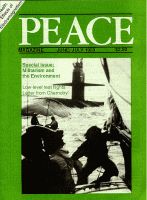
Peace Magazine Jun-Jul 1989, page 24. Some rights reserved.
Search for other articles by Maxime Faille here
During the last decade negotiations on a Comprehensive Test Ban (CTB) were stalled by the Reagan administration. A series of "Nuclear Testing Talks" between the superpowers were designed to "create the illusion of purposeful activity on the nuclear testing issue to deflect mounting political pressure worldwide," according to U.S. Senator Ted Kennedy.
However, 40 countries, taking matters into their own hands, have forced the world to the negotiating table to consider ending nuclear testing.
The breakthrough came in March when Tanzania and Papua New Guinea joined the countries requesting the U.S., USSR, and U.K. to convene a conference to consider amending the 1963 Partial Test Ban Treaty (PTBT) into a CTB. Now that over one-third of the States signatories to the Treaty have so requested, the convening of the conference is mandatory.
The idea of such a PTBT amendment has inched forward over four years, thanks to the perseverance of Parliamentarians Global Action (PGA), a network of national legislators from around the world. PGA enlisted effective allies: Nobel Peace Prize Laureate Ambassador Alfonso Garcia Robles of Mexico has led the effort at the international level, along with five other non-nuclear countries - Indonesia, Peru, Sri Lanka, Venezuela and Yugoslavia.
Key officials of the Kennedy administration (which negotiated the PTBT) now lobby for the amendment conference, along with a peace group network, the International Comprehensive Test Ban Coalition (ICTBC).
On August 5, 1988 - the 25th anniversary of the signing of the PTBT - the six non-nuclear states, having been supported overwelmingly by the General Assembly three times, formally submitted the amendment proposal.
The U.N. again welcomed this action, with only the U.S., the U.K., and France opposing (France is not a signatory to the Treaty, as isn't China, who didn't participate in the voting). The three original signatories (U.K., U.S., USSR), who are the Depositaries of the Treaty, dutifully circulated the proposed amendment to each of the 113 other states signatories.
Attention then focused on acquiring the necessary requests of one-third of all signatories. This effort was led by Ambassador Garcia Robles and his colleagues of the Mexican U.N. delegation, with the support of PGA and the ICTBC. One country, Togo, was prompted by the efforts of a New York City nun. The President of Togo, touched by her letter, ordered that his country be added to the list.
Now preparations for the conference are underway. It is too early to gauge its chance of success. The Bush administration is taking its time in defining its arms control and foreign policy. This may be a good sign; such a lapse, said officially to allow time for a major "rethinking" of policy, may be necessary to give credibility to any radical departure from the previous administration. Bush's top National Security advisor, Brent Scowcroft, had supported a CTB as early as two years ago.
Nonproliferation will be high on the Bush administration's agenda, particularly regarding chemical weapons and ballistic missiles. They will find these issues linked to nuclear nonproliferation, whether they like it or not.
The amendment conference is timely: Next year, the U.S., U.K. and USSR must again face the music at the Fourth Review Conference of the Non-Proliferation Treaty. Their failure to live up to their commitment has been the main issue at all previous Review Conferences -1975, 1980, and 1985.
The non-nuclear states had forfeited development of their own nuclear weapons in exchange for a CTB, which they saw as the minimal price for their pledge of nonproliferation. The nuclear powers' continuing failure to reach a CTB threatens the very future of the Treaty. (The NPT's first term in force expires in 1995. Its future will be decided then by simple majority of the parties, which is easily commanded by the nonaligned non-nuclear states.)
Among other incentives to accept the amendment proposal are the1990 American congressional elections. The Bush administration would do well to capitalize on the huge popularity of the CTB (75-80% support among U.S. citizens). The administration's party usually loses ground in mid-term elections. If Bush continues opposing the amendment, the gains by its supporters may enable Congress to pull the purse strings to cut off funding.
Still, don't hold your breath. The key ingredient has not yet emerged: widespread global pressure from citizens and governments. Canada, which has not supported the effort, will soon be invited to attend the conference. The public should then make sure that the government brings this message - that Canadians support this initiative.
Maxime Faille is with Parliamentarians Global Action, 211 East 43rd Street, Suite 1604, New York, N.Y.

Peace Magazine Jun-Jul 1989, page 24. Some rights reserved.
Search for other articles by Maxime Faille here